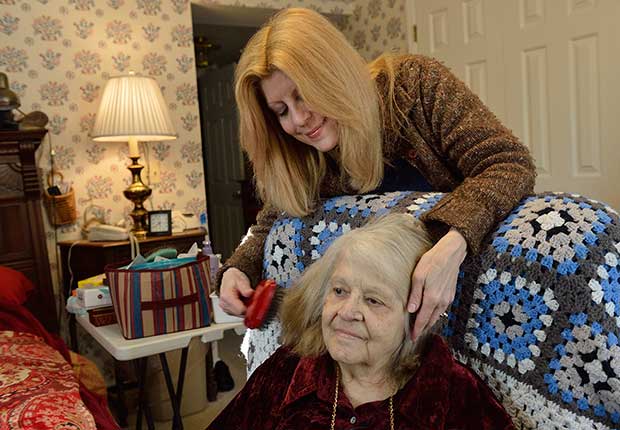AARP Hearing Center

By Christina Hernandez Sherwood
Susan Zebrowski has been her mother’s primary caregiver since the older woman received a diagnosis of bone marrow cancer more than two years ago. Along with household duties, Zebrowski sees to her mother’s needs by giving her medications, taking her to doctor visits and monitoring her condition.
Zebrowski, 59, of Mansfield Township, has had to figure out much of this on her own. When her mother, Matilda Albert, 85, was discharged after hospital stays, care instructions were generally limited to requests such as “see your doctor in a week,” she said. “It was nothing I would call specifically helpful.”
Under a new state law, however, hospitals must offer more support to family caregivers like Zebrowski. New Jersey’s version of the Caregiver Advise, Record, Enable (CARE) Act, which became law in November and takes effect this month, requires hospitals to provide patients with the opportunity to identify a designated caregiver upon admission. It also requires hospitals to notify that person when the patient is moved or discharged, and to provide that caregiver with adequate instructions for the patient’s care upon discharge.
For Zebrowski, any additional information about managing her mother’s condition would make a difference. “That would be helpful,” she said. “Being a caregiver, it’s isolating. It can be stressful. Even just being acknowledged would be helpful.”
The CARE Act will help support New Jersey’s 1.75 million family caregivers and the loved ones who count on them, said Douglas Johnston, interim state director for AARP New Jersey. The law “sets forth a template for improving support, recognition and educational resources for family caregivers,” he said.
AARP New Jersey spearheaded the legislative effort in the state, Johnston said, bringing the bill to four legislators who became its sponsors: state Sens. Joseph Vitale (D-Woodbridge) and Robert Singer (R-Lakewood), Assembly Speaker Vincent Prieto (D-Seacaucus) and Assemblywoman Nancy Muñoz (R-Summit). “This really was a consensus-building legislative process,” Johnston said.
Responding to a trend
Muñoz, a nurse, said the CARE Act goes into effect during major changes in health care. Patients are now discharged more quickly, she said, often with a host of health care needs, such as multiple medications and surgical follow-ups.
“I view this [law] as common sense,” Muñoz said. “It’s the right thing to do. It should have been happening for a long time.”
Six other states—Oklahoma, Virginia, West Virginia, New Mexico, Arkansas and Mississippi—have enacted a version of the CARE Act. About two dozen other states are working on similar legislation.
“By having hospitals work cooperatively with a patient’s preferred caregiver, we can ensure that they’re getting the level of care they need from the person they feel most comfortable with,” Prieto said.
New Jersey hospitals already have discharge processes that include education about after-hospital care, said Kerry McKean Kelly, vice president of communications and member services for the New Jersey Hospital Association. The CARE Act has stepped that up by creating a standardized procedure, she said.
To implement the CARE Act, Kelly said, hospital administrators will review their current practices, document designated caregivers and make tweaks to comply with the law: “Because they’ve been doing this work already, they don’t have to create a new process from scratch.”
The type of patient and family involvement promoted by the CARE Act is a trend in health care, Kelly said. Hospitals also face financial penalties under the Affordable Care Act if they readmit patients within 30 days.
“This is an issue where AARP and New Jersey hospitals have a common goal,” Kelly said. “That is simply to provide the best outcome for the patient.”
Christina Hernandez Sherwood is a writer living in Collingswood, NJ.































































